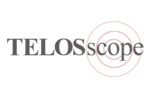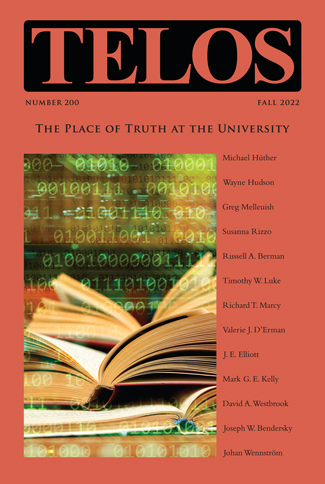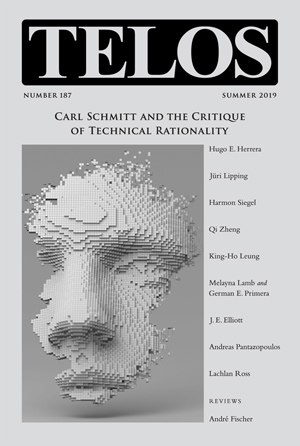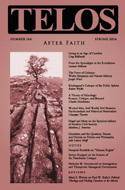In today’s episode of the Telos Press Podcast, David Pan talks with Greg Melleuish and Susanna Rizzo about their article “Universities: Truth, Reason, or Emotion?” from Telos 200 (Fall 2022). An excerpt of the article appears here. If your university has an online subscription to Telos, you can read the full article at the Telos Online website. For non-subscribers, learn how your university can begin a subscription to Telos at our library recommendation page. Print copies of Telos 200 are available for purchase in our online store.
|
Telos 200 (Fall 2022): The Place of Truth at the University is now available for purchase in our store. Individual subscriptions to Telos are also available in both print and online formats.

The following interview appeared in the Welt am Sonntag. This translation is published here with permission. Wolfgang Reitzle is one of Germany’s leading business executives. Translated by Russell A. Berman, with comments here. Welt am Sonntag: Mr. Reitzle, the corona crisis robbed many Germans of their illusions about this republic. They don’t recognize their country anymore. They used to think of it as progressive, organized, digitalized, and well led. Was that image of modern Germany just a fantasy? Wolfgang Reitzle: There have been plenty of signs of a discrepancy in Germany between appearance and reality: despite a defense budget of 47 billion euros, our guns can’t shoot, our tanks can’t roll, and our airplanes can’t fly—this doesn’t seem to bother anyone here, but other countries have taken notice. Our inability to build an airport for our capital city astonished the world. Berlin, a “Failed State”? Bureaucracy, Ideology, and Global Competition—Comments on Wolfgang ReitzleWolfgang Reitzle is one of Germany’s premiere business executives, and Klaus Boldt, part of the editorial leadership of Die Welt, one of the foremost business journalists. The wide-ranging interview here points to the multiple dimensions of the problems facing Germany at the end of the Angela Merkel era. The general elections in late September are sure to lead to a new coalition government in Berlin—and a new chancellor—who will face all the problems that Reitzle diagnoses, with the possible exception of the pandemic, hopefully over by the fall, even in Europe. While the coronavirus’s economic, social, and political consequences are however sure to linger on, it figures here primarily as an example of massive government failure and the toxic mixture of bureaucracy, ideology, and incompetence that Reitzle denounces and that leads him to call Berlin “a failed state.” Those are harsh words from a prominent leader of the German business community, especially when one recalls how in the U.S. political discussion in recent years Germany has been repeatedly held up as the better alternative to the Trump administration. Not long ago the myth of Angela Merkel as the new leader of the free world circulated through the press. That once-glowing imagery has now vanished in the face of the catastrophes of the German and the EU corona response, and the prospect of continued slow economic growth, fraying infrastructure, and insufficient support for technological innovation in the country where one would least expect it. Reitzle helps us understand why. J. E. Elliott’s “Insourcing Dissent: Brand English in the Entrepreneurial University” appears in Telos 187 (Summer 2019). Read the full article at the Telos Online website, or purchase a print copy of the issue in our online store. Individual subscriptions to Telos are available in both print and online formats. Nicholas W. Drummond’s “Immigration and the Therapeutic Managerial Government” appears in Telos 166 (Spring 2014). Read the full version online at the Telos Online website, or purchase a print copy of the issue in our store. |
||||
|
Telos Press Publishing · PO Box 811 · Candor, NY 13743 · Phone: 212-228-6479 Privacy Policy · Data Protection Copyright © 2024 Telos Press Publishing · All Rights Reserved |
||||


 Multiculturalism as state policy in the Western World has functioned without serious complications because an unequivocal division existed between the oppressive culture group and the culture groups requiring protection. Recent evidence suggests this distinction may be fading and the consequences are likely to be significant. Managerial governments traditionally accommodating towards diverse cultures are beginning to critically evaluate immigrant communities feared to be afflicted with objectionable pathologies like the tendency of some Islamic groups to promote gender inequality, homophobia, and Sharia law.
Multiculturalism as state policy in the Western World has functioned without serious complications because an unequivocal division existed between the oppressive culture group and the culture groups requiring protection. Recent evidence suggests this distinction may be fading and the consequences are likely to be significant. Managerial governments traditionally accommodating towards diverse cultures are beginning to critically evaluate immigrant communities feared to be afflicted with objectionable pathologies like the tendency of some Islamic groups to promote gender inequality, homophobia, and Sharia law.






